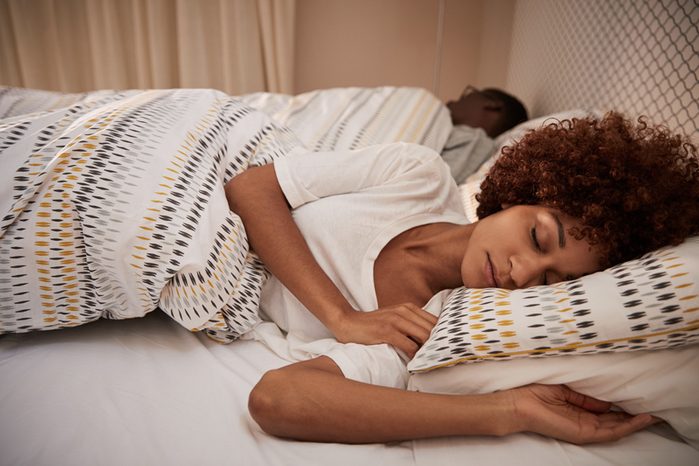
Experts agree: Sleep is the key
Ever found yourself stuck on a work project at 2 am, taking care of a sick child in the middle of the night or binge watching a new series until Netflix judgmentally asks you “Are you still watching?” If so, then you know all too well that what you do at night can have a huge impact on how the next day goes—and how “smart” you feel getting all your tasks done. Getting enough sleep is one of the best things you can do for your health, yet too many people are quick to sacrifice their sleep when other needs come up. Experts fall into this trap, too.
“Sleep is so important to me and I’m so bad at getting enough of it that it was my New Year’s resolution was actually to be in bed by 10 pm and asleep by 10:30 pm,” says Samantha Brody, ND, a naturopathic doctor and author of Overcoming Overwhelm: Dismantle Your Stress from the Inside Out. “My lack of sleep was seriously stressing me out—and I’m a stress doctor so of all people I should know better.”
Individual sleep needs vary but the CDC recommends adults get seven to eight hours of shut eye per night. Making sure you get this will help you look, feel, and perform smarter by boosting your energy, focus, willpower, and resistance to stress, Dr. Brody says.
Here’s How Much Water You Lose When You Sleep, According to an Expert
How to sleep smarter tonight
Getting a solid night of sleep can be easier said than done but it’s worth prioritizing, Dr. Brody says, especially if your goal is to get smarter. Simply getting enough sleep will grant you better focus the next day, reports the National Institute of Neurological Disorders and Stroke: Slumber helps the brain form new neural connections and consolidate memories. But you can enhance your sleep the same way you enhance your meals with greens and healthy spices: By following these tips tonight, you can ensure you’ll be at your sharpest tomorrow.
Get The Healthy @Reader’s Digest newsletter
1. Charge your phone in another room
The blue light from screens has been linked to insomnia, depression, and poor quality sleep. This makes your laptop, tablet and phone your worst enemies when it comes to sleeping better, sounder, and smarter, Dr. Brody says. Instead of scrolling right up until your eyelids droop (and no judgment, we’ve all been there!), 30 minutes before bed put your phone on a charger—in a different room. This keeps you from being tempted to check it one more time or in the middle of the night. If you need to keep your phone handy for safety, turn it face down and silence it. Many phones these days also come with digital wellbeing features, like screen dimming, bedtime reminders, and restricted hours. Set up these features and use them wisely.
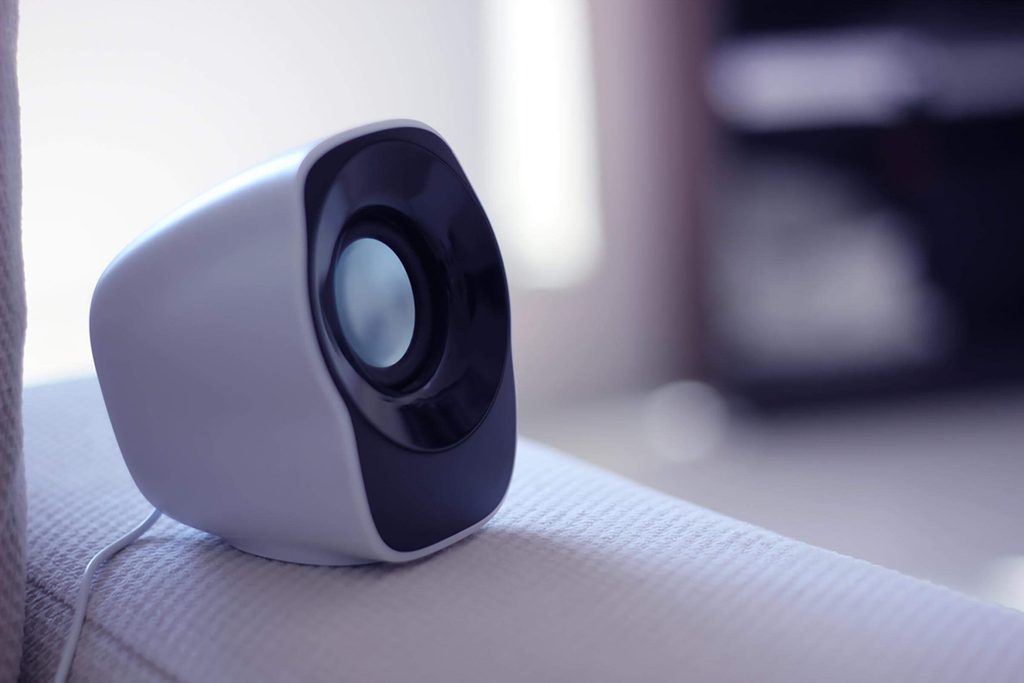
2. Pump up the pink noise
You’ve heard that white noise (like the light sound of a ceiling fan) is one small change you can make to catch more Zzzs. But pink noise, in which lower frequency sounds are more powerful—like the rush of a waterfall or pounding rain—may boost your brain, according to a study published in 2017 in Frontiers in Human Neuroscience. The researchers found that when older adults listened to pink noise, their deep, slow-wave sleep improved, and they scored three times higher on a memory test the next day compared to how they performed after receiving false treatment.
“Most people won’t notice much difference between white noise, pink noise, and brown noise except that pink noise has more of a ‘hiss’ sound and brown noise has more of a ‘shush’ sound, with white noise in the middle,” says Michael Grandner, PhD, director of the Sleep and Health Research Program at the University of Arizona in Tucson. “All of these work well at absorbing environmental sounds, but pink noise may have the ability to specifically induce brain wave patterns that enhance sleep, even though it is usually less able to filter out lower-frequency sounds and most patients report that it is less pleasant to fall asleep to.”
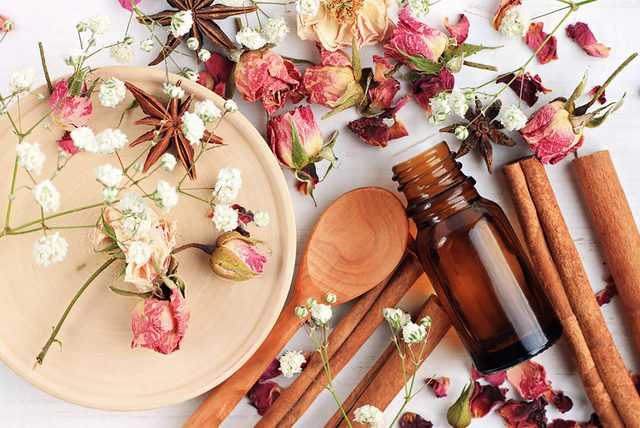
3. Take a whiff
You already know that the smell of an apple pie coming out of the oven can send you straight back to mom’s kitchen, but it can also strengthen your brainpower at night. In a study published in Science, participants played a memory game while a rose scent was in the room. After going to sleep, the researchers sent the rose aroma back into the room for one group. Those who were exposed to this scent during slow-wave sleep had a better recall of the day’s task compared to other groups. The researchers say that the olfactory system activates prior memories in the hippocampus, making it easier to store new info. Not everyone is convinced, however. “I don’t think there’s a chemical in scents that will help people sleep faster or deeper,” says Nitun Verma, MD, spokesperson for the American Academy of Sleep Medicine. “But creating a calm environment that helps you relax and unwind from the day is great! If a happy scent helps you relax, go for it.” All you need is a diffuser and your favorite scent and you’re ready to make memories. (Try these brain-boosting foods too.)

4. Have a glass of wine
If you like to indulge in a glass of wine daily, there are certain benefits to your health—including your brain. For a study published in 2017 in Scientific Reports, participants took part in a word-learning activity, then either drank alcohol or abstained. The next morning when they repeated the cognitive task, those who were in the drinking group performed better than the teetotalers. (In fact, the more they drank, the better their memory. It’s still recommended that women consume one drink per day, and men two drinks per day at most.) Alcohol may put brain cells into a state that allows them to consolidate memories, and sleep may enhance that effect.
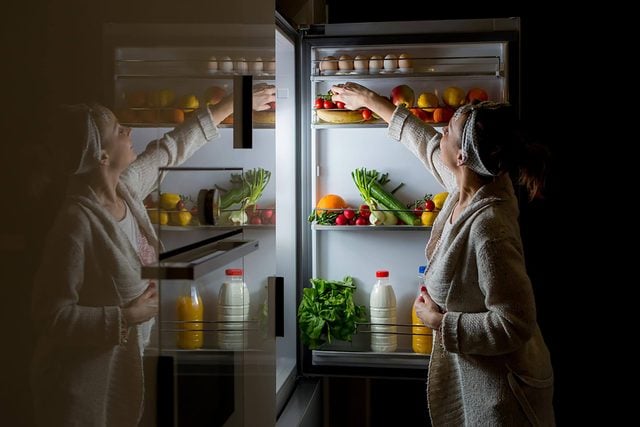
5. Avoid late-night noshing
If you find yourself performing midnight raids on the fridge, you may want to rethink your snack times. An animal study published in 2015 in Neuroscience suggests that eating at “off” hours (when you should be snoozing) can cause a hiccup in the activity of a protein that affects both the circadian clock and the hippocampus, the area of the brain responsible for memory.
“The best snack is no snack since most people’s metabolism is least efficient at burning energy you consume at night,” says Dr. Grandner. “This means that not only will calories consumed at night be more likely to result in weight gain and other disruptions to metabolism, but if you are hungry for a late-night snack, it might actually mean that you should have gone to bed already.” Satisfy the munchies earlier and save your smarts.
11 Healthy Late-Night Snacks Nutritionists Actually Recommend

6. Study before snoozing
Want to make sure you remember what you’ve just learned? Study before bedtime so you can sleep on it. A study published in 2019 in Current Biology found that the sleeping brain can encode new information and store it for the long-term. But it’s important to “get plenty of sleep after studying in order to maximize your learning,” says Dr. Grandner. “The sleep doesn’t need to occur immediately after studying, but it should happen before the next day.”
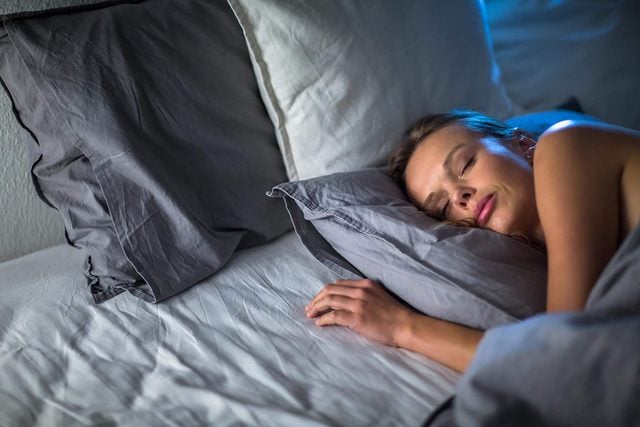
7. Dream about it
If a work task or presentation pops up in your dreams, be happy it did—because you may be able to remember more later. No matter what it was about, your dreams reveal a lot more about you than you think. Learning is encoded into your hippocampus during the non-rapid eye movement sleep stage (NREM). Dreaming about something you learned earlier that day during NREM sleep can help improve your memory, according to a study published in 2010 in the journal Current Biology. In the study, people were trained to learn about the layout of a complex maze and then tested five hours later after an afternoon nap. Those who had dreams related to the task performed better compared to those who didn’t have these reveries or who stayed awake and simply thought about the task.
‘Am I Smart?’ 8 Scientific Cues That Signal Intelligence, from Neuroscientists

8. Take a nap
Here’s another reason to “sleep on it.” A study of adults 65 and over, published in 2016 in the Journal of the American Geriatrics Society, suggests that post-lunch napping can help improve cognition. The nap-skippers in the study had significantly poorer cognition than short nappers.
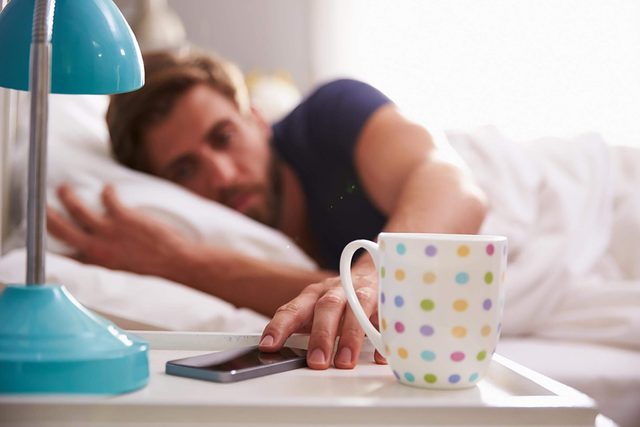
9. Wake up on time
You’d think the more sleep you get the better, but that’s not the case. “People who get nine to 10 hours of sleep or more on average tend to be in worse health,” says Dr. Grandner. He echoes the results of a study published in 2014 in Journal of the American Geriatrics Society which found that older women who slept more than nine hours a night or fewer than five fared worse on cognitive tests compared to those who logged seven hours of shut-eye. In fact, sleeping too much or too little was equivalent to having a brain that was two years older. The amount of sleep (more than nine hours or less than five) may be an indication that you’re having less quality, more fragmented sleep, which can take a toll on your brain health. Next, find out the secrets sleep doctors want you to know.
For more wellness updates, subscribe to The Healthy @Reader’s Digest newsletter and follow The Healthy on Facebook and Instagram. Keep reading:
- Queen Latifah: ‘Obesity Isn’t a Choice’
- Here’s What Happens If You Don’t Change Your Underwear
- New Harvard Study: Olive Oil May Reduce Dementia Risk by 28%
- New Study: Here’s How Often You Should Poop To Reduce Your Alzheimer’s Risk
Additional writing and reporting by Charlotte Hilton Andersen.
